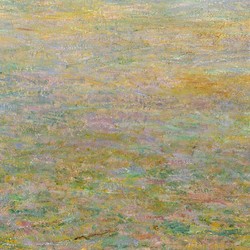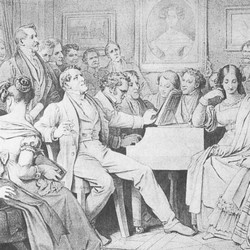- Details

As I told you when I talked about Die Götter Griechenlands, Friedrich Schiller shared the love for Ancient Greece that prevailed in German culture in his time, and Gruppe aus dem Tartarus [Group from Tartarus] also refers to mythology. The Underworld, often known by the name of his god, Hades, was the place inhabited by the dead; receiving no punishment or reward. Much deeper, according to Zeus at the Iliad, as far from the Hades as the sky is from the earth, there Tartarus was. And there, its inhabitants suffered the most horrific tortures.
- Details

"Take with you Paul Verlaine's Fêtes galantes and this little magical book will return to you, gently, harmoniously and delightfully sad, the ideal and enchanted world of the divine master of love comedies, the great and sublime Watteau, that the 19th century has just rediscovered"
These words are part of a review of April 19, 1869, that the poet Théodore de Banville wrote after the publication of the poetry collection Fêtes galantes, by his friend Paul Verlaine [...]
- Details

"Evenings on the Roof" was a chamber music series launched in Los Angeles in 1939. The venue was Peter Yates and Frances Mullen’ home, music critic and pianist (among other things) respectively. At that time, it wasn't easy to listen to contemporary music in the usual circuits, and many people missed it in that city, especially the exiled German musicians who gathered there. Weekly, Yates and Mullen used to offer new music for a small audience; the first concert was dedicated to Bartók and the series included premieres from Schoenberg and Stravinsky [...]
- Details

Moritz von Schwind arrived at Munich in 1828 to learn under Peter von Cornelius, Professor at the Academy of Fine Arts (two decades later, Schwind also became a Professor at the same art academy). Munich was at that time a much more stimulating place for artists than Vienna, where Schwind was born and had lived until then; King Ludwig I of Bavaria was an art lover (he founded the Glyptothek and the Neue Pinakothek, for example) and there were plenty of opportunities for young painters.
- Details

Musical works with choir and soloists are customary in symphonic seasons: symphonies such as Beethoven's Ninth or some by Mahler, masses, oratorios... even operas presented in concert version. But, as so often happens, some works are regularly programmed and some others, really beautiful, are hardly performed. Among these, Rosamunde, D. 797, a work by Franz Schubert that (please allow me some advice) run to listen to it if you haven’t done it yet.














